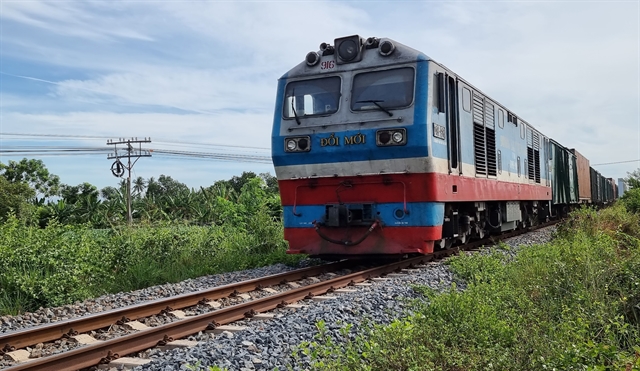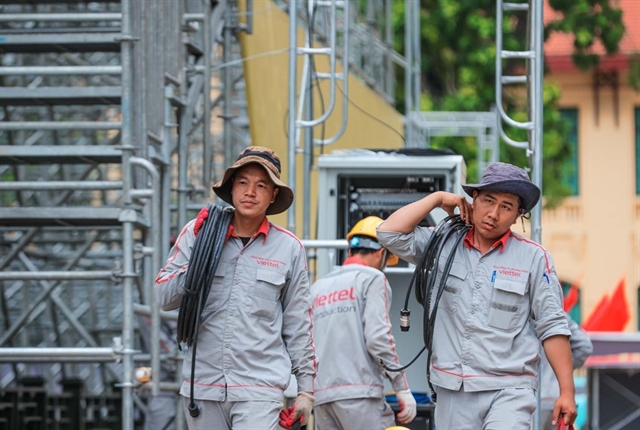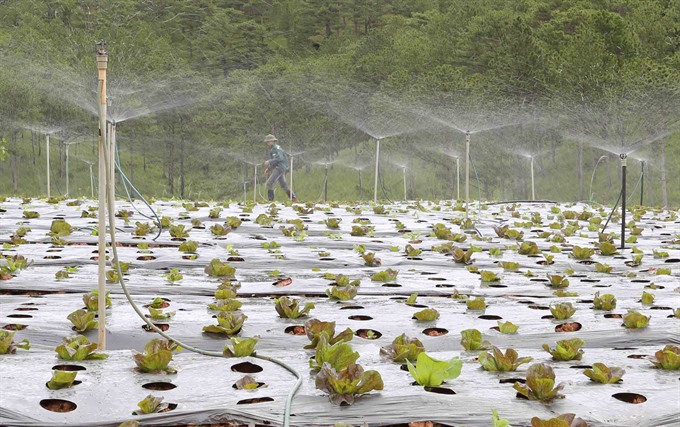 Economy
Economy

Việt Nam will speed up rationalising agriculture in concert with building new-style rural areas as part of policies for effective global economic integration, stated a Party resolution issued in Hà Nội last Saturday.
 |
| An automatically watered vegetable garden in the Central Highlands City of Đà Lạt. Việt Nam will focus on developing environmentally-friendly farming fields to produce exportable products with higher yield and greater value. — VNA/VNS Photo Nguyễn Dũng |
HÀ NỘI — Việt Nam will speed up rationalising agriculture in concert with building new-style rural areas as part of policies for effective global economic integration, stated a Party resolution issued in Hà Nội last Saturday.
The resolution, signed by Party General Secretary Nguyễn Phú Trọng, says the country aims to hold fast to political and social stability even as it joins new-generation free trade agreements (FTAs).
Members of the 12th Party Central Committee adopted the resolution during their fourth plenum last month.
The resolution says the country will strive to upgrade agricultural production, which remains almost small-scale with low technology levels and underdeveloped infrastructure.
It will focus on developing environmentally-friendly and organic fields to produce exportable products, which have higher productivity and greater values and are more resilient to climate change.
It encourages development of farming households and co-operatives, and linkage among the government, scientists, enterprises and farmers, to form value chains from production, processing, consumption to export.
The country will modernise and commercialise agriculture to foster large-scale production based on technology. It will promptly build master plans to stimulate products having a competitive edge while supporting areas hit by FTAs.
It will also attract more business investments in agriculture.
These are in line with general goals to intensify self-reliance of the economy, open markets, and take advantage of supplemented capital, technology, knowledge and management experience for faster growth and more sustained development.
The resolution says Việt Nam is steadfast on its course to independence and self-reliance in its foreign policies, and it will diversify international relations.
The country considers economic integration a focus in global integration, and businesspeople, enterprises and intelligentsia are vanguards of this cause of the people.
The resolution says the country must stimulate development of enterprises and products to improve national competitiveness, and complete legal frameworks for effective performance of FTA commitments.
It is to maintain economic security and macro-condition stability to cope with international fluctuations, and renew its growth model while restructuring its economy.
Growth in export, foreign direct investment (FDI) and labour productivity will be direct criteria to assess outcomes of global economic integration.
Creating an advantegeous business and investment climate is a strategic priority to mobilise domestic and overseas resources for development.
Trade remedies, technical barriers and measures to deal with disputes are to be well built for efficient exploitation of international commitments over the next five to 10 years.
Environmental issues
The resolution says Việt Nam must deal with environmental issues properly, use natural resources efficiently, be resolute in asking investors to protect the environment, and strictly treat those damaging the environment.
It must tightly control sources of pollution, seeking to completely prevent contamination near trade villages, river valleys, industrial zones, urban areas and coast lines.
It is to drastically tackle units causing serious environmental problems, especially large-scale FDI projects, and hasten control of exhaust fumes from motor vehicles in major urban areas.
The country will promptly complete regulations on social responsibility of enterprises towards consumers and the environment, and accelerate socialisation of environmental sanitation developments.
Every citizen should supervise environmental protection and report evironment deteriorating actions.
The country will boost international ties in managing and using transnational water supply, especially of the Mekong River.
It will intensify protection and development of forests, especially watershed and coastal-protective and special-purpose forests.
Trade union
The resolution says Việt Nam must renovate operations of trade unions and manage other workers’ organisations at enterprises in the international integration process.
The Việt Nam General Confederation of Labour must have resources strong enough to take care of workers and protect their legal rights and interests.
The Việt Nam Fatherland Front and political-social organisations, as well as the Việt Nam Chamber of Commerce and Industry and associations representing the business community, are to promote their roles.
The country will review legal documents regulating operations of workers’ organisations to assure their legitimate benefits, while helping enterprises succeed in doing business.
It guarantees that workers’ organisations at enterprises are established and operate in conformity with Vietnamese law and principles of the International Labour Organisation (ILO), while maintaining political and social stability.
The resolution says social consensus is needed for efficient global integration.
The country will improve the business climate, build modern socio-economic infrastructure, and attach special importance to developing human resources as strategic priorities to improve national competitiveness.
Other major policies for integration are: consolidating national defence and security, promoting national prestige and position in the international arena, preserving cultural values of the people, and settling social issues.
Việt Nam has reached significant achievements since it joined the World Trade Organisation in 2007, the resolution says.
International economic integration has driven the country’s socio-economic development, pushed it to complete institutions of a socialist-oriented market economy and open the domestic market, created many jobs, and helped Vietnamese entrepreneurs mature.
Integration has also helped the country maintain a stable and peaceful environment for development, and preserve independence, sovereignty and unification.
With new-generation FTAs, such as the Trans-Pacific Partnership and European Union-Việt Nam FTA, the country will have more opportunities to expand markets, take greater part in global production and supply chains, and improve people’s lives.
The country will also have more chances to participate in international institutions and structures that help it better protect national interests.
Domestic enterprises can be more creative and competitive, and local consumers can access more quality goods and services with cheaper prices.
The country faces political, economic and social challenges, however.
It will have to scrutinise legal regulations to avoid negative impacts that may occur while reviewing laws related to labours, jobs and environment as part of international commitments.
Performing according to ILO standards will also challenge the Việt Nam General Confederation of Labour in assuring its role, and the country in ensuring political and social stability.
Many business areas, enterprises and products of Việt Nam will find difficulties coping with stiff competition.
“Opportunities may become challenges if we fail to take advantage of them at an opportune time. Challenges may turn into opportunities if we successfully cope with them in a proactive manner,” the resolution says. — VNS